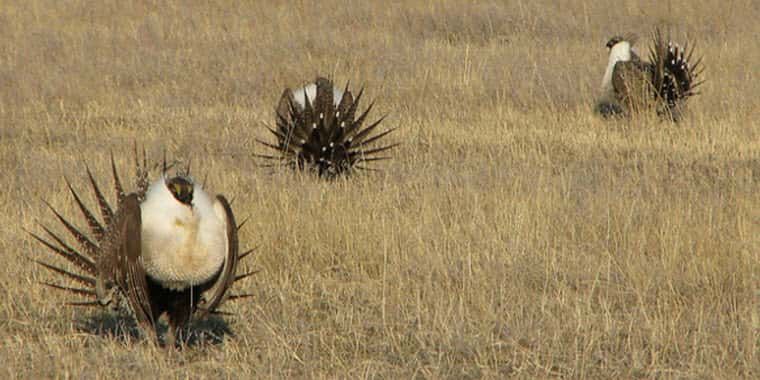by C.J. Hadley, Range Magazine
“In a classic Washington story, where power is everything and the process is laced with insider intrigue, backroom deal making, political chicanery, scheming backstabbing, conspiring turncoats, partisan obstinacy, and shifty bureaucratic maneuvering, a football-sized wild bird has handed the West the potentially most devastating federal triumph yet in the losing battle for western states’ rights.”—Stephen Studdert, former presidential advisor
The great American West is engaged in a war—what Wyoming Sen. Michael B. Enzi calls a “regulatory war”—over the stewardship and use of pubic and private lands. It is a war the West is losing, according to Stephen M. Studdert, a former senior White House advisor to three presidents. Studdert’s story is paired with an analysis written by Dave Skinner, an award-winning investigative reporter who is known for his exhaustive research. Studdert worked for presidents Ronald Reagan, George H.W. Bush and Gerald Ford.
[EasyDNNGallery|3696|Width|400|Height|400|position|left|resizecrop|False|lightbox|False|title|False|description|True|redirection|False|LinkText||]Writing in the Spring issue of RANGE magazine, Studdert and Skinner reveal a “back door” manipulative action by the Department of Interior that leaves everything at stake, even summer and winter recreation. Economically, included in the bureaucratic bull’s eye are water, oil and gas production, coal mining and coal power plants, cattle and sheep grazing (food production), mineral extraction and timber production (wildfire suppression). RANGE is a publication devoted to commonsense solutions to problems affecting people who live and work on the land, and is the recipient of three consecutive Freedom of the Press awards.
THE DEBATE
“In what has been a hotly debated topic for several years,” writes Studdert, “the state/federal battle over the greater-sage grouse, a bird about the size of a football is about far more than a bird. It is about the destiny of western states and the ranching way of life, about food production and resource extraction, about something we used to possess called private property rights, and about whether ‘we the people’ or Washington hacks control our future and our livelihoods.”
Dave Skinner explains the backstory: “Sixteen long years ago, environmentalists [Green special-interest groups] first petitioned to list the greater-sage grouse as threatened or endangered under the Endangered Species Act [ESA],” he writes. “Almost everyone involved, whether environmentalists, agency staff, or western producers, is aware a sage grouse listing and its ‘protections’ will have economic and policy consequences akin to those from the listing of the northern spotted owl in the Pacific Northwest.”
The spotted owl listing, the child of special-interest groups, created leapfrog destruction affecting all of America. Wildfires. The listing effectively closed the timber industry, which in turn led to a biomass of clogged, diseased trees, made worse by drought—a tragedy-in-the-making just waiting for the guaranteed summer lightning strikes.
Skinner explains that thanks to 2011’s “multispecies settlement” with special-interest groups—WildEarth Guardians and the Center for Biological Diversity—the U.S. Fish & Wildlife Service had a deadline to decide on the ESA status of the sage grouse by Sept. 30, 2015.
SNEAKING THROUGH THE BACK DOOR
[EasyDNNGallery|3695|Width|350|Height|350|position|right|resizecrop|False|lightbox|False|title|False|description|True|redirection|False|LinkText||]Shortly before the September 30 listing deadline, U.S. Secretary of Interior Sally Jewell ambushed states rights and private property rights when she quietly determined behind closed doors that state and private efforts to save the greater-sage grouse mean the bird no longer faces extinction and does not need to be listed as an endangered species, writes Studdert. Some heralded this camouflaged federal ploy as a victory for all parties, he adds.
“Jewell’s cagey move,” as one western governor proclaimed, “was the equivalent of a listing decision outside the normal process and fail[ed] to support an appropriate balance between conservation and other public uses of the land.”
With a stroke of her pen, Jewell bypassed years of legal contest leaving the fed’s management plan and rules and agenda in force and let the states be damned, writes Studdert. Those federal plans are so excessively restrictive and costly that they are equivalent to a listing under the ESA, but without any legal process to challenge.
Jewell’s decree was arbitrary and final, he concludes.
[EasyDNNGallery|3694|Width|350|Height|350|position|left|resizecrop|False|lightbox|False|title|False|description|True|redirection|False|LinkText||]The secretary’s move “changes nothing,” according to Rep. Rob Bishop (R-UT), chairman of the House Natural Resources Committee. “They did not go through the front door. They went through the back door…. They have the same type of control as if it is listed.”
The financial devastation to the West is incalculable, writes Studdert. Federal bureaucrats will be able to control not only our land but also everything that happens on it, no matter who owns it.
“The West won the battle to keep the sage grouse off the endangered species list, but through federal sleight of hand we lost another colossal war over federal land-use dominance in our slow death by regulation,” writes Studdert.
“My old boss, Ronald Reagan, believed private property rights to be ‘one of our most precious rights’,” says Studdert. “They are fundamental to our United States. What the federal government has just pulled off in the name of one football-size bird is nothing but a federal taking of states rights and private property rights that will have immeasurable, unforeseen, and very costly consequences for generations of westerners,” predicts Studdert.
Digital versions of “Dances With Chickens,” by Dave Skinner, and “How the West Was Lost,” by Stephen M. Studdert, can be found by visiting RANGE’s Home Page, www.rangemagazine.com.
Source: Range Magazine



